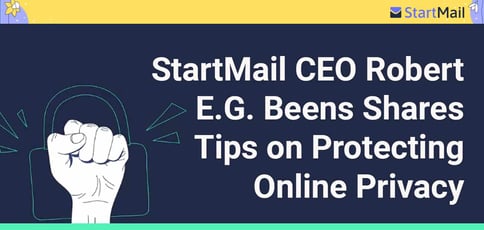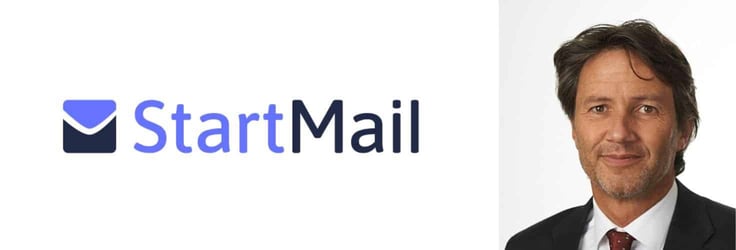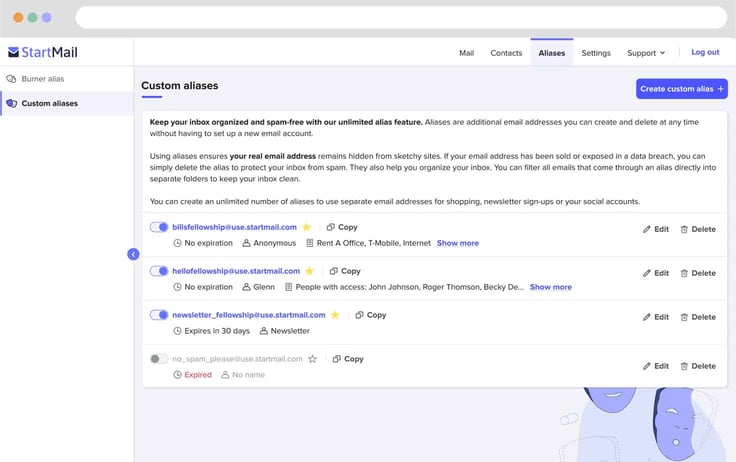
TL; DR: We spoke with StartMail CEO and Co-Founder Robert E.G. Beens about online privacy in today’s climate and how users can reassume control over their personal information. Many application and service providers have taken advantage of consumers by selling their data for profit. Robert told us users can fight back by leveraging privacy-first tools, limiting data sharing, and reading the fine print for details on cookies. By using the services of companies such as StartMail, customers can protect their data from third parties and receive a seamless experience from a provider that values privacy.
About 79% of global web users say they believe they have lost total control over their personal information and sensitive data. That’s an alarming number, but it is one of the truths that help describe the current state of online privacy. Many people don’t know they are making their data vulnerable online when sharing it. Thankfully, news on this subject has helped users learn about the pitfalls of sharing their data.
“Unfortunately, in most cases, our online data is sold, manipulated, stolen, or exposed on the open web. This can lead to many unwanted consequences. Seeing annoying ads that follow you around the internet is just the tip of the iceberg,” said Robert E.G. Beens, StartMail CEO and Co-Founder.
Awareness of the problem is only the first step. Robert told us that Big Tech companies have profiles of information on customers they use to sell to third parties. But online hackers can also access user data and leverage it for more malicious purposes, including phishing attempts and identity theft. Users must take appropriate steps to protect themselves if they want to keep their sensitive information from the wrong hands.

“That’s why taking measures to protect our privacy online is so important. At StartMail, we consider privacy a basic and universal human right that should be protected at all costs,” said Robert.
StartMail delivers a privacy-first email solution that users can leverage to send encrypted messages and protect their data from malicious actors and third parties. By using the services of privacy-focused application alternatives, customers can start to take back control of their data and manage how it’s used online. StartMail allows users to maintain digital privacy and keep their emails between themselves and their recipients.
Take a Proactive Approach to Safeguard Sensitive Data
Robert spoke to us about the actions users can take to change the trajectory of their online privacy. Data has become an important currency for companies in today’s market. Most websites and applications collect detailed profiles of users, and companies leverage this information for value gain. Businesses can have data on user names, email addresses, workplaces, search, email, and browsing history. With this type of access, companies find a lot of value.
“This information is combined into a single profile and then analyzed to understand your preferences and behaviors. This profile can then be sold to third parties for marketing purposes or used to target you with personalized ads,” said Robert.
Privacy breaches have become the norm, and many people feel hopeless in the battle to take back control of their data. But Robert said the best action for users is to take measures to protect themselves. These steps are often overlooked but easy to implement.
Robert told us users can limit data sharing and avoid posting sensitive data, such as home addresses, phone numbers, or Social Security numbers. By being mindful of online data sharing, users can keep information private and away from the wrong people. Social media users can also look at their default settings and modify them for data security. Social media default settings are rarely privacy-friendly.
“Since social media has become an integral part of our lives, it’s essential to review and update your privacy settings regularly, limiting access to your profile information, such as your date of birth, posts, location, and photos,” Robert said.
Robert said another overlooked measure people should consider is reading the fine print. Although it can be tedious, reading the fine print can highlight many hidden details of online privacy. “Before signing up for any service or app, carefully read the privacy policies. Be aware of the type of data a company is collecting, how they are using it, and what type of access they have to your device. By taking the time to read the fine print, you can ensure your privacy is protected,” said Robert.
Leverage Privacy-Focused Alternatives for Digital Activities
One of the best ways to protect digital privacy is by switching to privacy-first products. There are many companies out there that value online privacy and include it as their mission to safeguard user data on the web. By leveraging privacy-focused technology, users can take a proactive approach to protect their personal information.
“You can secure your emails by subscribing to an email provider like StartMail that encrypts your messages and protects you from surveillance, tracking, and spam. Consider switching to a private search engine like Startpage, which does not track, analyze, or save your search queries, and provides unprofiled search results,” said Robert.
Users can take advantage of the numerous easy-to-use, privacy-focused alternatives to Big Tech products. Privacy-focused tools exist for various use cases, meaning users can find one for almost every digital activity. It won’t be difficult for customers to switch out all their applications to accommodate their privacy and web needs. Web users can also leverage specific features, such as an email alias, to hide their identity online.

“An alias can help protect your identity when you sign up for a new online service and ensures your main email address remains hidden from sketchy sites. Aliases also help you cut down on junk mail, protect your inbox from spam, and help identify where your data has been leaked or sold,” said Robert.
Email aliases are a fantastic place to start when protecting privacy because email usually ties everything users do online together. Since email connects customers to their various online accounts and activities, they can use aliases to keep companies from leveraging their actual email addresses. According to Robert, junk mail usually increases when an email is exposed in a data breach or sold. He said customers can use aliases for their accounts to identify where breaches occurred and then delete the alias, leaving their real email address untouched and exclusive.
“Aliases can also be an incredibly helpful tool to organize your inbox. You can filter all emails that come through an alias directly into a separate folder to keep your inbox clean and organized,” said Robert.
Unlike other email providers, StartMail allows customers to generate an unlimited number of aliases. This way, they don’t have to worry about hitting a cap and can continue to protect their email from spam and phishing.
StartMail Provides Robust Email Services for Privacy-Conscious Customers
Free email services have a way of getting their due, even if it isn’t directly from a user’s wallet. They may protect users from certain security risks but don’t protect them from themselves. Free email services can scan email inboxes for information, opening users to unwanted advertisements and phishing attacks. Google has been caught doing this multiple times in the past. According to StartMail, 89% of survey respondents said they don’t want their data used for personalized ads. It’s no surprise customers want their privacy protected.
“Many of our customers are tired of being tracked, receiving spam, or living under surveillance by Big Tech or the government. They value StartMail as a means to protect their sensitive data and communicate privately,” said Robert.
StartMail values user privacy and does not track email activity or collect personal information in any way. It built its email solution for privacy-conscious customers and industries requiring high-level security, including healthcare and financial confidentiality. Located in the Netherlands, StartMail adheres to Dutch privacy legislation and GDPR, which means user emails and data are protected at a government level.
StartMail has upgrades on the way for its platform. Robert told us all product upgrades are based on customer feedback. Its most recent update has to do with its email alias feature. With this new release, StartMail will enable customers to add notes to custom aliases, create disposable ones in one click, and have streamlined access to the feature.
“We’re always looking for ways to enhance the customer experience, so we are now focusing on solidifying and improving our current operations and offerings for our customers in other areas. Going forward, our focus will not only be on reinforcing and strengthening our current operations but also on expanding our reach globally,” Robert said.



